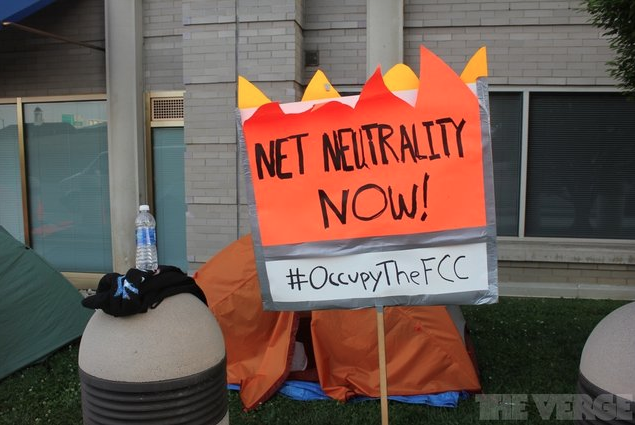The Verge: The real battle for net neutrality just began
Over 100,000 people spoke up, and lawmakers are listening. We now have a golden opportunity to enshrine the principles of the open Internet in law. Check this article out to see what's at stake Article by Ari Robertson for The Verge The FCC has voted to accept Chairman Tom Wheeler's proposal for a new net neutrality framework, kicking off a longer rule-making process that will conclude in the next several months. And while the new proposal has been amended from an earlier, more controversial text, it leaves open the question of internet "fast lanes," an issue that many see as fundamentally undermining net neutrality.
The new proposal builds on the 2010 Open Internet Order that was struck down earlier this year, but it's seeking comment on a number of issues that have proved central to the net neutrality debate. Broadband providers would have to hold to a minimum level of quality for any service, but otherwise, they're only required to adhere to "commercially reasonable" standards. The agency is asking for comment on what those standards should be, including whether ISPs should be barred from allowing companies to pay for better service. It's also attempting to create oversight for companies, proposing an ombudsperson who would represent internet users and investigate possible violations of the order. Wireless broadband providers have long been held to looser standards than wired ones, but the proposal encourages reevaluating this.
Perhaps most notably, Wheeler is asking for input on what laws the FCC should use to regulate net neutrality. The proposed rules use Section 706 of the Telecommunications Act, which allows the agency to promote broadband competition. In January, a federal court took issue with the FCC's use of this rule, saying that it was trying to treat companies like more heavily regulated common carriers and scrapping virtually the entire order. But the FCC latched onto a piece of the decision that gave it more limited powers under Section 706, promising to create a new rule that kept the spirit of net neutrality alive. It's been positioning its defeat as an opportunity ever since.
- Read more at The Verge


 Take action now!
Take action now!
 Sign up to be in the loop
Sign up to be in the loop
 Donate to support our work
Donate to support our work